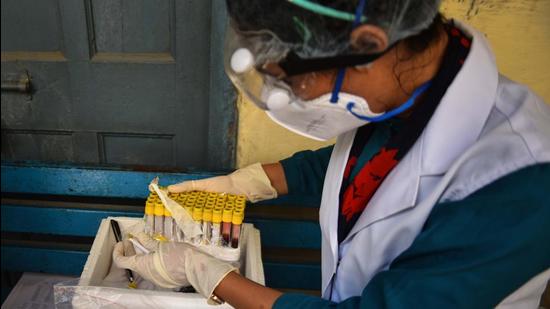85% had antibody count in adequate levels: Delhi sero survey
The test for neutralising antibodies was carried out at the Institute of Liver and Biliary Sciences for a portion of the 28,000 samples collected for the serological survey.
Over 85% of samples that tested positive for antibodies against Covid-19 in Delhi’s September serological survey had enough neutralising antibodies to stop virus replication in the lab, according to a detailed report submitted to the Delhi government this week.

At least 97% of Delhi’s residents had antibodies against the virus, the preliminary report submitted in mid-November showed.
“What this finding means is that a high proportion of the 97% people who were found to have antibodies can effectively fight off an infection,” one of the reseachers said, requesting anonymity.
Also Read | Up to 64k beds, better oxygen infra: Delhi ready for Omicron, says CM Kejriwal
The report will be released soon, a Delhi government official said, also declining to be named. The latest report is likely to contain details on vaccine acceptance and hesitancy in the capital city.
The test for neutralising antibodies was carried out at the Institute of Liver and Biliary Sciences for a portion of the 28,000 samples collected for the serological survey. It was the first time an exercise was conducted to find out the proportion of people with antibodies who could fight off an infection.
The usual sero-surveillance depends on a semi-quantitative test for the antibody IgG that the body develops 10 to 14 days after an infection. The tests show whether a person has the antibody and whether the levels are high or low, but it does not give a specific quantity. In comparison, a complete antibody profile test shows the various types of antibodies as well as their levels.
Neutralising antibodies are important as they directly tackle the virus and either destroy it or prevent it from entering human cells. It means that even after someone gets infected, they are unlikely to have a full-blown disease. Neutralising antibodies develop within the first week of symptoms starting to show and last for six months to a year.
“Not only have we seen that 85% of the samples were able to neutralise the virus, we have also seen high levels of antibodies in these individuals, said a second researcher involved in the survey. “We saw IgG antibody levels ranging from 1 to 22 among the samples, with the median being 11,” this person added on condition of anonymity.
That is a high level. The Institute of Liver and Biliary Sciences required a person to have an IgG of 5 to donate convalescent plasma when the therapy was being used for treatment of those with Covid-19. An IgG antibody level of 5 was enough to ensure that it worked even at a dilution of 1: 80 for neutralising antibodies, as recommended by the Indian Council of Medical Research.
Stay updated with all top Cities including, Bengaluru, Delhi, Mumbai and more across India. Stay informed on the latest happenings in World News along with Delhi Election 2025 and Delhi Election Result 2025 Live, New Delhi Election Result Live, Kalkaji Election Result Live at Hindustan Times.
Stay updated with all top Cities including, Bengaluru, Delhi, Mumbai and more across India. Stay informed on the latest happenings in World News along with Delhi Election 2025 and Delhi Election Result 2025 Live, New Delhi Election Result Live, Kalkaji Election Result Live at Hindustan Times.






